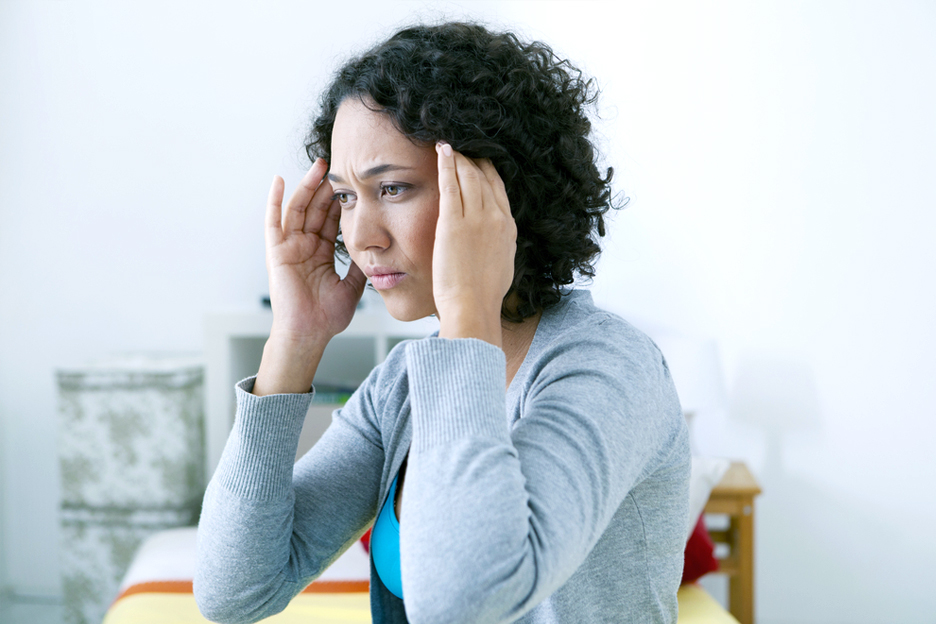Do you ever have such severe headaches that you feel like pulling your hair out? Do they prevent you from functioning normally and enjoying life at its fullest? You may be suffering from migraines, a disorder that affects up to 19% of adults in Québec. Here are a few tips to help you fight this enemy of well-being.

Migraines: pain that stops everything
Extreme headache, nausea, vision problems… migraines are more than simple headaches. Their symptoms are much more intense and quite varied. For migraine sufferers, everyday activities such as going to work or taking care of the household can sometimes seem impossible. If you are in this situation, the following may interest you.
Migraines are caused by a complex neurological disorder whose causes are still not completely known. We do know, however, that the typical symptoms of migraines are due to a series of events in the brain (electrical disorder, inflammation, dilatation of vessels, etc.).
Women are three times more at risk of suffering from this condition than men. Migraines mostly affect young adults; past the age of 50, attacks become more sporadic.
A migraine attack can last from a few hours to a few days. The frequency and severity of attacks are different from one person to another; some people suffer from migraines several times a week, while others only get them a few times a year. The following symptoms distinguish migraines from common headaches:
- pain is more intense on one side of the head;
- pulsating pain;
- nausea or vomiting;
- vision problems (blurred vision, black spots);
- sweating;
- intolerance to noise.
What can trigger a migraine attack?
Several factors can trigger a migraine attack, but they are not the same for everyone. If you suffer from migraines, try to identify the factors you need to avoid. Here are a few examples:
- stress/intense emotions;
- fatigue;
- hormone fluctuations (such as menopause and menstruation);
- changes in sleeping habits;
- strong smells (perfume, cigarette smoke, chemical products, etc.);
- climactic factors (extreme cold or heat, for example);
- loud noises;
- bright light;
- hunger or skipping meals;
- consuming alcohol;
- eating certain foods.
Some medications can also cause migraines. This is the case, for example, for birth-control pills. If you get migraines after taking the pill, several options are available to you. If migraines always occur during the seven-day inactive period, it is recommended to take the pill continuously (without stopping). Otherwise, it is possible to take a pill with a lower dose of hormones.
Consult your pharmacist if you suffer from intense headaches or migraines after starting a new medication.
Available treatments
There are two types of anti-migraine treatments: abortive treatment (during attacks) and preventive treatment (long term, for preventing attacks).
Abortive treatment consists of medication that is taken as soon as migraine symptoms appear to relieve them quickly. When attacks do not significantly disrupt the patient’s quality of life, treatment is similar to that of a regular headache (taking analgesics, anti-inflammatories, etc.). However, when attacks significantly hinder daily activities, it is possible to take medication specifically designed to treat migraines.
If you suffer from frequent or debilitating migraines, long-term treatment can potentially prevent them. Medications used in this context must be taken every day and offer numerous benefits. They reduce the frequency and severity of attacks and improve the effectiveness of abortive treatments. But because it can take several weeks for these medications to be completely effective, patience is required.
If you must take medication as part of an abortive migraine treatment, here is a bit of advice:
- Take your medication as soon as you notice the symptoms or warning signs of a migraine.
- Follow the manufacturer or pharmacist’s recommendations related to dosage.
- Never take more medication than what is recommended.
- If you don’t feel relief when you take your medication or if you experience side effects, talk to your doctor or pharmacist. They may be able to change your medication.
For preventive treatment:
- Take your medication every day, as prescribed.
- Tell your pharmacist and doctor about all the medications you already take, including over-the counter drugs and natural health products. They can check for any risk of interaction.
- In case treatment does not work (after several weeks of treatment) or if you experience side effects, consult your health professional.
Lifestyle changes
Your lifestyle can have an influence on the frequency and severity of migraines. Here are some things you can do to reduce them:
- Avoid factors that trigger your migraines.
- Adopt a healthy, balanced diet.
- Don’t skip meals and eat until you are full.
- Drink plenty of water during the day.
- Reduce your intake of alcohol.
- Learn to manage stress.
- Avoid overexertion.
- Get enough hours of restorative sleep.
- Take time for yourself, to relax. Get a massage, meditate, take up yoga or any other activity that allows you to “take a break”.
- Exercise regularly.
- Abstain from smoking and avoid second-hand smoke.
- Listen to the signals your body is sending.
“Making it through” an attack
When you feel a migraine coming on, follow these measures:
- Stop whatever you are doing.
- Rest in a dark, quiet room.
- Reduce surrounding noise.
- Avoid strong smells.
- Avoid exposure to the sun.
- Apply cold compresses to your head or forehead.
- Gently massage your scalp or apply pressure to your temples.
- Practice relaxation techniques.
Most migraine attacks are difficult to endure. Using medication is often necessary, but managing migraines doesn’t stop there. You can take concrete steps to prevent migraines on a daily basis and reduce their impact on your well-being and quality of life when they do occur. Health professionals like your pharmacist can give you more information about migraines and the different means to prevent and eliminate them. Your mind is full of interesting thoughts and ideas… don’t let migraines push them aside!